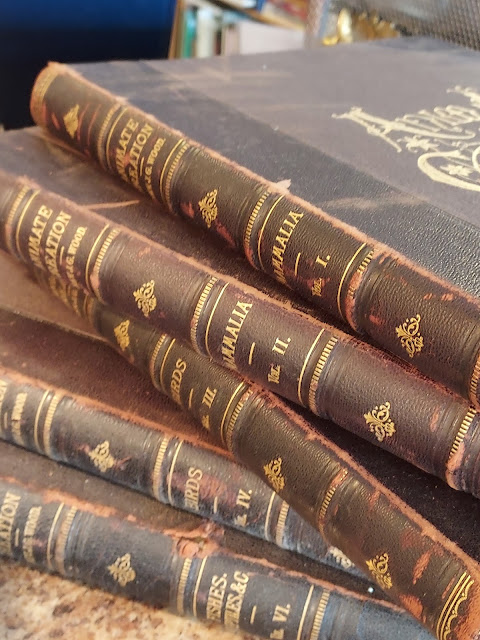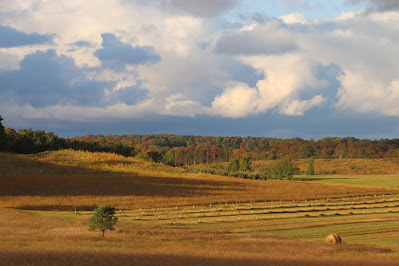Evenings Out
It is rare for me to go out in the evening, other than outdoors in my own yard, but July is the month when the Friends of the Leelanau Township Library hold their Summer Writers Series, featuring one Michigan author a week for four weeks. The third week of the series this year was author and farmer and chef Abra Berens, and not only was she FOLTL guest author on Tuesday but the following Thursday she prepared a special chef’s dinner, also at the Willowbrook Inn. Two nights out in one week!
 |
| Abra Berens at the Willowbrook Inn |
 |
| Sommelier du soir |
The Willowbrook is a magical event venue, elegant and at the same time simple and old-fashioned. Mimi DiFrancesca and Joel Heberlein, in transforming the 140-year-old building, have only added to its charm, such that it is always a joy to be there. The windows invite the outdoors in, giving the feeling that one is in a very grand and spacious treehouse. And this time, of course, there was Abra’s wonderful menu, served by friendly faces, many of them familiar. Quite the evening out!
Also noteworthy is that a portion of ticket sales from Thursday’s dinner went to Food Rescue, people doing much-needed and important work in northern Michigan.
My role in the program came following dessert and was – no surprise! – selling books that Abra happily signed for her satisfied diners. Sunny Juliet was ready for play when I got home, and I was ready for sleep, but we worked it out.
 |
| Books are my life. |
Mornings Outdoors
In my life, mornings mean outdoors, and while that’s usually in our own yard, sometimes Sunny Juliet and I go farther afield. Friday we did what I call “Go for a ride, go for a walk,” where we get in the car and have a leash walk (or two or three) somewhere other than our familiar home grounds, with stops also simply to give the dog momma a chance to photograph lovely sights.
 |
| That pond on Alpers Road again -- |
Books as Antifragile Technology
Nassim Nicholas Taleb (and my, how that name keeps cropping up in my posts lately!) does not have an entry for ‘books’ in the index to his book Antifragile, but because BOOK is an important topic in my life, not only as a reader but also as a bookseller, I have added the term to his index, noting the number of each page where books enters the discussion. First, in the chapter on “Via Negativa,” he notes that “the future is mostly in the past,” by which he means that the longer a technology or a way of doing things has survived, the longer it probably will continue to survive. This means that, contrary to human beings, with technologies and ways of doing things, the older will typically survive the younger. Following that logic (and he gives several examples), we can predict with some assurance that the continued life of the printed book will greatly surpass that of the e-reader.
“No one reads books any more,” people told me when I opened my bookstore 31 years ago – hence my new motto:
Surviving skeptics for over 200 dog years
-- though I’m happy to say the skeptics seem fewer in number with each passing year, as more and more people seem to rediscover books and realize that paper and print are here to stay. In fact, I rarely hear the dismissive, skeptical claim about books so often voiced three decades ago.
 |
| Oldest on the premises -- at present |
Taleb distinguishes between the perishable (objects) and the nonperishable, the latter having what he calls an “informational nature to it.”
A single car is perishable, but the automobile as a technology has survived about a century and a half (and we will speculate should survive another one). Humans die, but their genes—a code—do not necessarily. The physical book is perishable—say, a specific copy of the Old Testament—but its contents are not, as they can be expressed into another physical book [my emphasis added].
In this passage we deal with the technology of the book in a different way, not predicting the life of the technology but the “imperishability” of the information it carries.
What of the perennial human craving for novelty, for whatever is “new and improved”? Anything that has an electronic on/off switch, Taleb thinks, is something that can induce neomania in us – the feeling that we have to have the very latest model – whereas what he calls “the artisanal” (and I take it this could be a book as well as a painting by an Old Master or a piece of furniture, examples he cites) continues to be satisfying even as newer items are available all around us. Thus the artisanal is antifragile, the electronic fragile to time and change.
The e-reader is fragile in another way that the book is not. Accessibility to electric power, battery life, and the general fatigue that overtakes computerized parts all make the e-reader more fragile than the bound, printed volume. How many laptops have you gone through in the past 30 years? But do you have a paperback book from college days in the Sixties? I do – and it still “works” perfectly, as do these volumes from the late nineteenth century.
 |
| These have endured. |
Taleb received a letter from a historian Paul Doolan in Zurich, asking how young people could be taught skills for the 21stcentury, since we have no way of knowing what skills will be needed. Taleb’s perhaps surprising answer (perhaps not, if you’ve been reading his work) is to have those young people read the classics. This is where the sentence appears: “The future is in the past.”
We cannot return to the past, and few of us would choose to do so. The wisdom of the past, however, the accumulated knowledge of our culture is the legacy to us of all who have lived before, and we can avoid many errors by learning what hasn’t worked out well for our human ancestors.
What is success, for an individual, a corporation, or a culture? Taleb tells us the most important factor is the avoidance of unsurvivable error or the unforeseeable, rare but unsurvivable event. Mere survival does not insure success, but there is no success without survival, so it is crucial to avoid that fatal misstep.
We cannot learn from what has not (yet) happened or what might happen, only from what has happened.
 |
| History: Learn from it. |

































